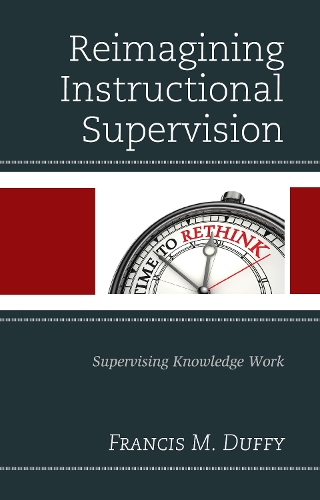
Reimagining Instructional Supervision: Supervising Knowledge Work
(Hardback)
Available Formats
Publishing Details
Reimagining Instructional Supervision: Supervising Knowledge Work
By (Author) Francis M. Duffy
Bloomsbury Publishing PLC
Rowman & Littlefield Publishers
21st March 2017
United States
Classifications
Professional and Scholarly
Non Fiction
Educational strategies and policy
Teacher training
371.207
Physical Properties
Hardback
174
Width 160mm, Height 238mm, Spine 17mm
408g
Description
The history of instructional supervision has been relatively constant. From the days when the first colonists arrived and established schools for their children until today instructional supervision has consistently focused on the critical examination of a teachers classroom behavior with the assumption that supervising individual teachers could significantly improve teaching and learning throughout a school system. That assumption has proven to be flawed. The author believes that the focus of instructional supervision needs to shift off of individual teachers to focus on transforming the organization design and functioning of entire school systems. Instead of observing teachers working in their classrooms a re-imagined instructional supervision process would focus on transforming three sets of key system variables: Transform the systems environmental relationships, transform the systems core and support work processes, and transform the systems internal social infrastructure. Supervising Knowledge Work describes the salient features of a re-imagined supervision process called Knowledge Work Supervision that is designed to transform entire school systems.
Reviews
Frank Duffy is one of the preeminent supervision scholars today. He has writtena two-volume treatise that surpasses mundane treatments of the subject by demonstrating the importance of workingat organizationalredesign and transformation rather thantinkering with individual classrooms. Such forward thinking is not only refreshing, but actually paves a practical path to achieve his lofty vision for high performance schools. -- Dr. Jeffrey Glanz, EdD. professor of education, Azrieli Graduate School, Yeshiva University, Jerusalem, Israel
Francis Duffy presents a much needed framework for examining instructional supervision in his latest book, Re-Imagining Instructional Supervision. Through his approach Knowledge Work Supervision (KWS), Duffy leads the reader in dissecting why traditional forms of instructional supervision have not worked, and with urgency and authority, he examines in depth the key variables needed to transform not only schools but also the corollary practices that supervisors can enact to align their practices. This book adds depth to the field of instructional supervision, and is a resource that I will consult often in my own research and outreach and partnerships with school leaders. -- Sally J. Zepeda, University of Georgia; author of Professional Development: What Works, Second Edition
This is a book and an author on a mission: To transform and transcend our deeply entrenched, tragically obsolete Industrial Age paradigm of education and how it attempts to improve classroom teaching. Their tool: A model of system-wide instructional supervision and restructuring called Knowledge Work Supervision (KWS) that offers entire school districts a well-designed, visionary way to design and implement learning systems worthy of 21st Century expectations for both learners and teaching professionals. Gone is the standardized assembly line approach to instruction that plagues todays sorry approach to reform. In is an inspiring approach to meeting student needs that actually leaves no child behind. To that end, Dr. Duffy has done his homework, offering a detailed rationale, description, and how-to guide for implementing KWS, plus advice on how KW Supervisors can be trained and certified to initiate, lead, and implement the model. The promise for districts: a re-imagined and transformed high-performing, knowledge-creating way to educate; one devoid of silver bullet quick-fixes. What will it take to implement KWS Educators with sufficient courage, passion, and vision to keep pushing forward as they face the inevitable obstacles to authentic system change. -- William Spady, Visionary Change Agent
In a time where teacher evaluation and accountability is a core component of educational reform efforts, and teacher education programs across the nation are reporting shrinking enrollments, this book presents an essential argument. By applying systems thinking to the task of reimagining instructional supervision, Frank Duffy has put forth guidelines to not only help schools (and their communities) understand how to implement a process to improve teaching, but also established a framework for transforming the very nature of how teachers teach one that aligns with modern needs. Current educational reforms struggle to solve the seemingly insurmountable problems our educational system faces because the system was never meant to produce the outcomes it is being asked to produce. This text argues not only for designing a new system of education meant for our information age but details how schools can themselves act as learning organizations and enact a system that works better for teachers, students, and all stakeholders. Duffy has put forth a vital work that advances our conversation on the vision of what school should be and how and we can realize that vision. -- William R. Watson, Associate Professor of Learning Design & Technology, Purdue University
Author Bio
Francis M. Duffy is a Professor of Public Administration at Gallaudet University. He specializes in large-scale transformational change in school systems.
